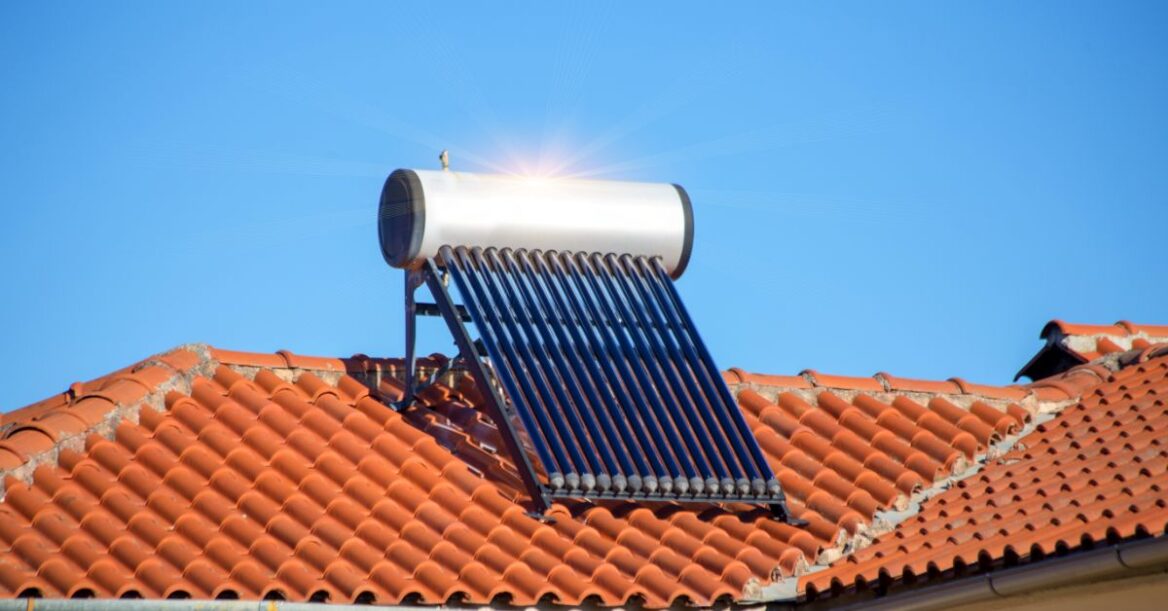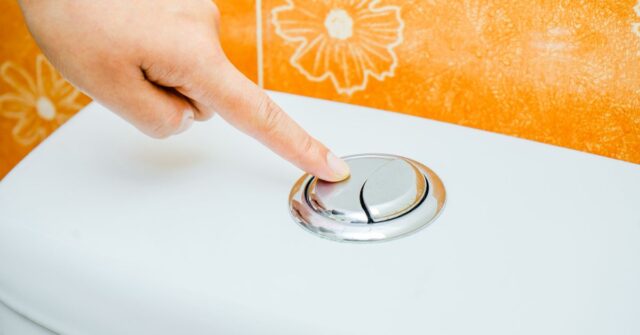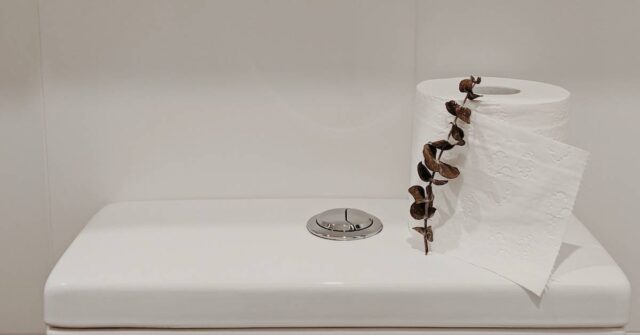Australia, with its vast landscapes and abundant sunlight, is a prime location for harnessing the power of solar energy.
For property owners, particularly in a country with rising electricity costs and a strong emphasis on sustainability, using this renewable source of energy is a logical step forward.
One of the ways to do so is by incorporating solar water heaters in your bathroom.
Let’s delve into the importance of this technology and guide Australian homeowners on how to make this sustainable transition.
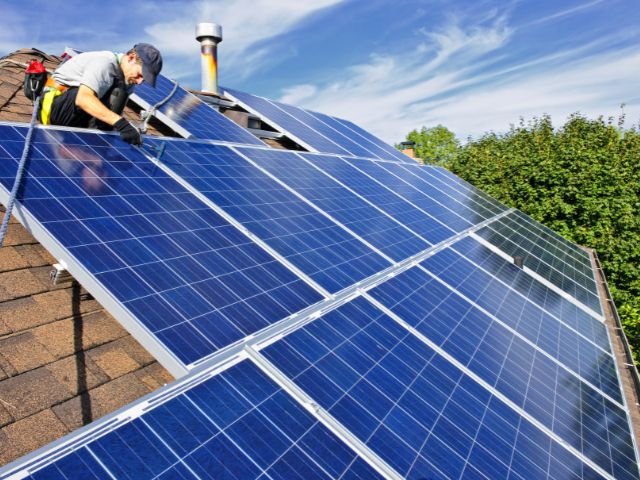
The Importance of Solar Energy in Australia
Solar energy isn’t just a buzzword; in Australia, it’s becoming a way of life. The country’s geographical position and climate offer unique advantages for harnessing solar power.
But why is it so important, particularly for water heating in homes?
The Australian Climate and Solar Potential
Australia’s vast landmass and largely sunny weather provide an incredible opportunity for capturing solar energy.
Most parts of the country receive more than 4 kWh per square meter of solar radiation daily, making it a hotspot for solar installations.
This abundance of sunlight makes solar water heaters a viable and efficient choice for many Australian homes.
Government Initiatives and Support for Solar Energy
The Australian government recognises the potential of solar energy. There are numerous incentives, grants, and rebates available to homeowners who wish to install solar panels or solar water heaters.
This support not only makes the transition to solar more affordable but also showcases the nation’s commitment to a greener future.
Environmental Impact and Sustainability
By using solar energy, homeowners contribute to reducing their carbon footprint, as solar systems emit no greenhouse gases.
With the current challenges of climate change, moving towards sustainable solutions like solar water heaters is not just an economic choice but an ecological imperative.
Understanding Solar Water Heaters
Before making the decision to install a solar water heater in your bathroom, it’s essential to understand what they are and how they function.
The underlying principle remains the same: capture sunlight and convert it into heat. However, the types and methodologies vary.
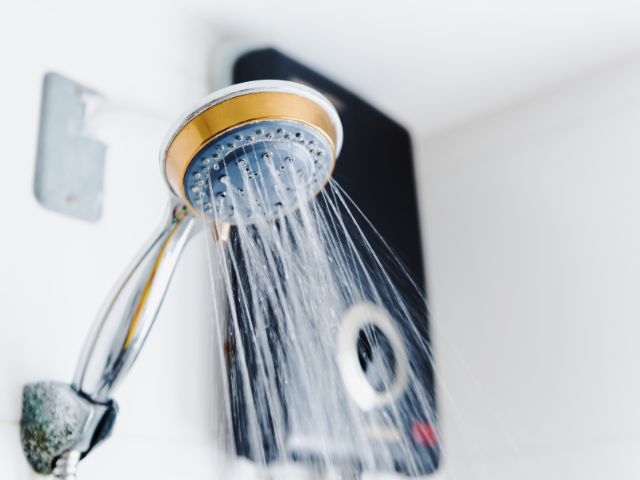
How Solar Water Heaters Work
Solar water heaters capture sunlight through solar collectors. These collectors heat a fluid (either water directly or a special solar fluid).
This heated fluid then transfers its heat to the water stored in a tank, which can be used for bathing, cleaning, and other household purposes.
Types of Solar Water Heaters
While all solar water heaters operate on the same fundamental principle, there are different types based on the method of collecting and transferring heat.
Passive Solar Water Heaters
Passive systems rely on gravity and natural convection. As water heats up, it rises, and cooler water sinks, creating a circulation without the need for pumps.
They are generally simpler in design and less expensive but may be less efficient than active systems, especially in colder regions.
Active Solar Water Heaters
Active systems use pumps to circulate the heated fluid. They are more efficient and can be used in various climates. However, they are also more complex and can be more expensive than passive systems.
Benefits of Using Solar Water Heaters
Apart from the obvious environmental benefits, solar water heaters can significantly reduce electricity bills, are durable with long lifespans, and can increase the overall value of a property.
Why Your Bathroom is the Perfect Place for a Solar Water Heater
The bathroom is one of the primary consumers of hot water in a household. Implementing a solar water heater here can result in substantial energy savings and a noticeable reduction in electricity bills.
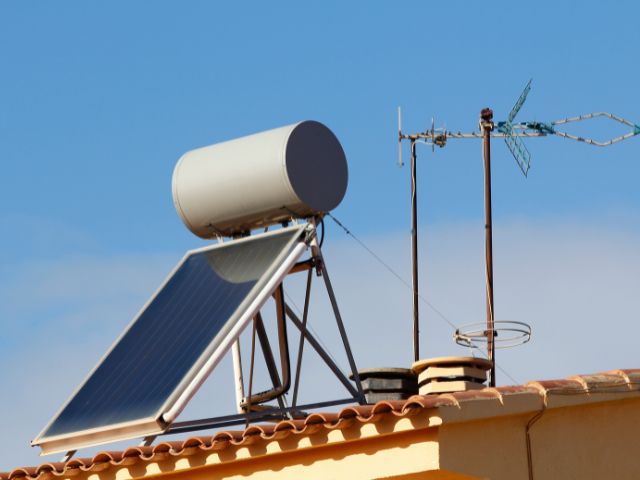
The High Energy Demand of Bathrooms
From showers to baths, the demand for hot water in bathrooms is consistent. Traditional electric or gas water heaters can be expensive to run.
By switching to solar, homeowners can harness the power of the sun, reducing reliance on non-renewable energy sources and saving money in the process.
Maximising Efficiency and Reducing Costs
With the direct use of solar-heated water in bathrooms, the energy loss is minimised, ensuring maximum efficiency.
Plus, after the initial installation costs, the ongoing expenses are minimal, leading to long-term financial savings.
Factors to Consider Before Installation
While solar water heaters are beneficial, they aren’t a one-size-fits-all solution. Various factors need to be considered to ensure you choose the right system for your home.
Your Home’s Solar Potential
Consider the amount of sunlight your property receives. Houses with unobstructed roof areas that face the north will typically harvest more solar energy.
Available Space and Orientation
The size and orientation of your roof, along with any potential shading from nearby structures or trees, can affect the efficiency of solar collectors.
Integration with Existing Plumbing
Check if your current plumbing system is compatible with a solar water heater, or if modifications are needed. Some homes might require additional plumbing work, which can affect installation costs.
Local Regulations and Standards
Always ensure that your solar water heater meets Australian standards. Also, check local council regulations to ensure compliance and see if any permits are required.
Steps to Incorporate Solar Water Heaters in Your Bathroom
Ready to make the switch? Here’s a step-by-step guide to help you on your solar journey.

Conducting an Initial Assessment
Engage with a professional to assess your home’s solar potential, understand your hot water needs, and receive recommendations on the best system for your circumstances.
Choosing the Right System for Your Home
Based on the assessment, choose a system that aligns with your home’s solar potential and your family’s water usage patterns. Consider factors like system capacity, efficiency, and warranty.
Installation Process and Best Practices
Always hire licensed professionals for installation. Ensure the system is oriented correctly to maximise sunlight capture and is integrated seamlessly with your home’s plumbing.
Maintenance and Upkeep
Regular maintenance ensures the longevity of your system. Check for any damages, clean the collectors, and ensure the system operates efficiently.
Most solar water heaters require minimal maintenance, but periodic checks can prevent potential issues.
Cost Analysis: Investment vs. Long-Term Savings
While the initial investment in solar water heaters can be substantial, the long-term savings, both financial and environmental, can be significant.
Initial Costs of Solar Water Heaters
Prices can vary based on the type of system, brand, and capacity. On average, the cost of a solar water heater in Australia can range from $3,000 to $7,000, including installation.
Government Rebates and Incentives
The Australian government often offers rebates and incentives to reduce the initial costs. Research available offers in your state or territory to understand potential savings.
Long-Term Energy Bill Savings
Once installed, the ongoing costs of a solar water heater are minimal. Depending on your location and usage, you can expect to save between $300 to $700 annually on your energy bills.
Real-life Examples: Australian Homes with Solar Water Heaters
Still unsure? Let’s look at some real-life examples of Australian homeowners who made the switch and their experiences.

Urban Homes: Incorporating Solar in Limited Spaces
City dwellers, with limited roof space, have successfully incorporated compact solar water heaters. These systems, designed for urban environments, provide consistent hot water while occupying minimal space.
Rural Homes: Maximising Solar Potential
Rural properties, with expansive open areas, can fully harness the power of the sun. Large solar collector arrays ensure that homeowners have an uninterrupted supply of hot water, even in the colder months.
Success Stories: Australians Who Made the Switch
From Perth to Sydney, countless homeowners have transitioned to solar water heaters. Their stories highlight the ease of transition, the noticeable reduction in energy bills, and the satisfaction of contributing to a sustainable future.
Conclusion: The Future of Bathrooms is Solar
As Australia continues its journey towards sustainability, the integration of solar technology in homes becomes more relevant.
For homeowners, solar water heaters represent a tangible step towards greener living. With the dual benefits of cost savings and environmental conservation, the future of bathrooms is undoubtedly solar.

